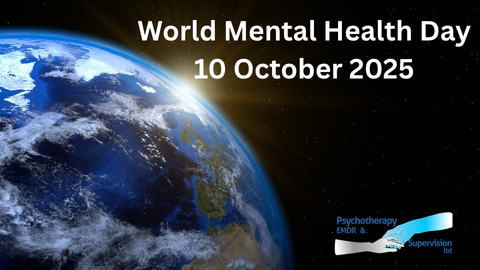
World Mental Health Day – Every year on October 10th, people around the world come together to recognize World Mental Health Day—a day to raise awareness, reduce stigma, and remind ourselves that mental health is just as important as physical health.
Run by the World Health Organization, this year’s theme is, “Access to Services – Mental Health in Catastrophes and Emergencies”.
This is a powerful reminder that we all deserve access to care, compassion, and community support—no matter our background or circumstances.
Whether you’re currently working on your mental health, supporting someone else, World Mental Health Day is a great opportunity to pause and reflect on how you’re doing—and what you might need more (or less) of in your life.
Here are three simple but effective tips to help you take care of your mental well-being:
1. Stay Connected
Spending time with people you trust—friends, family, or a support group—can make a big difference to your mental well-being. Even a quick chat or message can help you feel less alone. If you’re struggling, reaching out and talking to someone is a good first step.
2. Take Care of Your Body
Your mind and body are closely linked. Try to:
- Get regular sleep
- Eat nourishing foods
- Move your body daily (even a short walk helps)
- Limit alcohol, caffeine, and screen time
Small physical habits can have a big impact on how you feel mentally and emotionally.
3. Practice Mindfulness or Relaxation
Taking a few minutes each day to slow down, breathe, and check in with yourself can reduce stress and improve clarity. Try:
- Deep breathing
- Meditation
- Journaling
- Spending quiet time in nature
What if you need more than self-care?
Sometimes how we feel can mean that we need more than self-care, sometimes we need to reach out and ask for help from someone else.
However, it can be difficult to ask for help, especially if you’re feeling low, anxious, or overwhelmed. But you don’t have to go through it alone.
Here are some ways to take that first step:
What You Can Do:
- Talk to someone you trust. Whether it’s a friend, partner, or colleague, sharing how you feel can bring relief and clarity.
- Speak to your GP. They can help assess what’s going on and guide you toward support. Ask someone to go with you if it helps.
- Seek private support. Many qualified therapists offer confidential, professional support. You can search via the Counselling Directory to find someone in your area.
- Use online services. There are many websites and apps offering immediate support, including text and chat services.
- Crisis Support Services:
- Samaritans – Available 24/7: Call 116 123
- Shout – Free 24/7 text support in the UK: Text 85258
Would You Like to Talk to a Therapist?
If you’re struggling with your mental health or going through a difficult time, speaking to a therapist can really help. Paul offers: Psychotherapy and Counselling, EMDR and Clinical Supervision
To book an appointment:
- Call Paul on 07843 813 537 (If he doesn’t answer, please leave a message—he may be in a session, and he’ll get back to you as soon as he can.)
- Or complete the form on the Contact Page
For more details, visit:
Worried About Someone Else’s Mental Health?
On World Mental Health Day you may be concerned about the mental or emotional wellbeing of a friend or relative, it can feel difficult to start the conversation. When someone is struggling, they may not feel able to ask for help—so your support can really make a difference.
The Mental Health Foundation offers helpful guidance on how to approach these situations. Below is a summary of their key suggestions:
How You Can Offer Support:
- Create space for a conversation. Find a quiet moment without distractions so they feel safe to talk.
- Let them set the pace. Don’t pressure them to talk more than they’re comfortable with. Talking about feelings can feel vulnerable—go gently.
- Avoid diagnosing or “fixing.” It’s tempting to Google symptoms or try to explain what they’re experiencing, but this can be unhelpful or even harmful. Try to listen without assumptions.
- Ask open, neutral questions. Avoid grilling or digging. Simple, open questions help them express what they feel without pressure.
- Explore small, realistic self-care ideas. You might gently discuss steps they could take that feel manageable to them.
- Listen closely and without judgement. Just being present and really hearing them can mean a lot.
- Offer help to find professional support. This could mean helping them find a GP, therapist, or trusted mental health service.
- Look after yourself too. Supporting someone else can be emotionally draining. Make sure you have support in place and don’t hesitate to reach out if you need help yourself.
Please explore the helpful articles and blogs on this website for more ideas about how you can support your emotional, mental and physical wellbeing on World Mental Health Day 2025.



